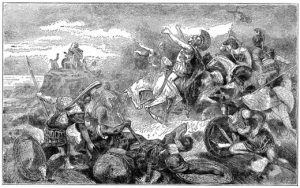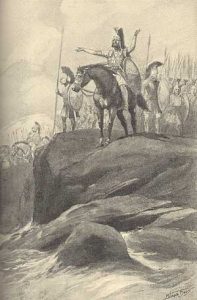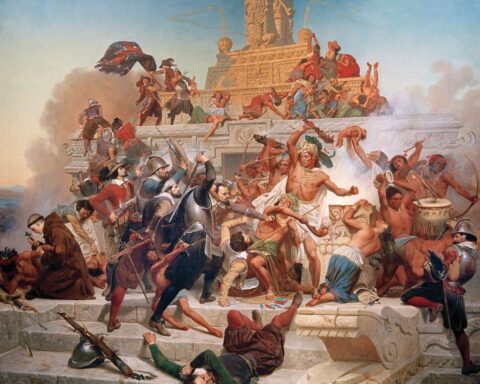Or, How to Succeed When Everything Goes Horribly, Horribly Wrong In Every Way Possible.

Xenophon may have embellished a bit to cast himself in a better light and the situations direr, but if so I thank him.
Cyrus the Younger decided that he, not Artaxerxes his elder brother, should be king of Persia. History is a bit murky as to the exact details but it’s likely his decision was in part due to his mom urging him to be king and a failed plot to assassinate his brother led to his imprisonment. Whether Cyrus had plotted or not is known but he certainly was offended by his time in prison.
In 401 BC, Cyrus began his bid for the throne. As he amassed his forces he pretended he was moving against the Pisidians, a tribe based in the Taurus mountains. As part of the mercenary troops he had hired fourteen thousand Greeks, mainly Athenians and Spartans, and Xenophon was among their number. Once everyone was in motion and deep in Artaxerxes’ lands, Cyrus admitted to the true purpose of the expedition. The Greeks weren’t too keen on the whole idea since they had signed up for honest money to take on the Pisidians and keep whatever they could plunder, not to help the younger brother overthrow his brother. Cyrus allayed the Greeks’ fears with promised of large rewards and downplaying the dangers.
Cyrus had long been known as a man that kept his promises and was true to those that had stuck by him.
According to Xenophon:
Many were the gifts bestowed on him, for many and diverse reasons; no one man, perhaps, ever received more; no one, certainly, was ever more ready to bestow them upon others, with an eye ever to the taste of each, so as to gratify what he saw to be the individual requirement. Many of these presents were sent to him to serve as personal adornments of the body or for battle; and as touching these he would say, “How am I to deck myself out in all these? to my mind a man’s chief ornament is the adornment of nobly-adorned friends.” Indeed, that he should triumph over his friends in the great matters of welldoing is not surprising, seeing that he was much more powerful than they, but that he should go beyond them in minute attentions, and in an eager desire to give pleasure, seems to me, I must confess, more admirable. Frequently when he had tasted some specially excellent wine, he would send the half remaining flagon to some friend with a message to say: “Cyrus says, this is the best wine he has tasted for a long time, that is his excuse for sending it to you. He hopes you will drink it up to-day with a choice party of friends.” Or, perhaps, he would send the remainder of a dish of geese, half loaves of bread, and so forth, the bearer being instructed to say: “This is Cyrus’s favourite dish, he hopes you will taste it yourself.” Or, perhaps, there was a great dearth of provender, when, through the number of his servants and his own careful forethought, he was enabled to get supplies for himself; at such times he would send to his friends in different parts, bidding them feed their horses on his hay, since it would not do for the horses that carried his friends to go starving. Then, on any long march or expedition, where the crowd of lookers-on would be large, he would call his friends to him and entertain them with serious talk, as much as to say, “These I delight to honour.” [1]
Cyrus was, therefore, able to assuage their fears and concerns. He had built up a reputation of being a straight shooter and just with those that were loyal to him.
The initial push into the king’s land was initial unopposed. The king scrambled to get his troops in position and with his trusted satrap, Tissaphernes, finally engaged his younger brother at Cunaxa, a place west of modern Baghdad.
The battle was hard fought on both sides, Cyrus even wounding his older brother until he himself was slain.
The Greeks found themselves in the middle of hostile territory, miles and miles from home, without their patron, with every man’s hand against them, and a furious Persian King wanting them dead for their affront against him.
The Greeks were cast into disarray as they tried to figure out what to do to get them out of Persia in one piece. During their confusion and indecision, they reached out to any reed, no matter how thin. First, they offered their services to Ariaeus, who refused. Then they tried Tissaphernes who also refused their services but demanded their surrender. The Greeks wouldn’t capitulate to his terms.
Tissaphernes was in a bind. The Greeks were too heavily armed and armored to wipe out in a frontal assault and they were too skilled to succumb easily to attrition. He offered them food, then let them stew for quite some time. He pretended that there were issues involved in getting things ready. After it seemed like the Greeks were about to do something besides sit around, he led them northwards, claiming they would be allowed to go home and pass through the lands unmolested if they left the land alone.
The Greeks followed, grateful for the chance to get out of the mess. Tissaphernes threw a banquet and invited all the Greeks’ military leadership. Having their suspicions assuaged by his previous honest behavior, they went. Tissaphernes betrayed them and had them beheaded, slaughtering them all.
The remaining Greeks were in full panic, frozen and unable to do more than wait for death to come for them by the hands of Tissaphernes.
Xenophon looks around and realized no one else was going to a thing about the situation. So he acts. He gets the army to organize, elect new leadership, and get moving. He embodies the idea that “a good plan, violently executed now, is better than a perfect plan next week”[2]. They had nothing but what they could carry but they were heavily armed and armored with some light troops mixed in with the heavies. While they couldn’t win a decisive victory against the king’s forces neither could the king do more than harass them.
They marched through the land as the king and native tribes attacked and killed as many as they could. During that time, the Greeks kept making on the spot decisions about organizing themselves, about tactics and strategy. Xenophon is at the core of all these decisions. He didn’t always succeed but he has more successes than failures. A few times, the Greek vote him out of power, only to turn around and reinstate him as soon as things start falling apart. He never does more than point out they are being fickle idiots when could have easily ousted those that plotted against him. Through his leadership, they fight their way back out of Persia and other lands, both hostile and neutral, until the survivors reach home, where the book just ends, which is not atypical for the style.
The organization method they utilize isn’t an ordered democracy or republic. Instead, it was more akin to the code of the pirates with a small inner circle and everyone else given the choice to follow or not. “If you fight and if you survive, you get a cut of the plundered loot.” And it worked. Instead of being overrun and killed, they kept the military command structure functioning well enough to get home with six thousand out of the reported ten thousand that started out with Xenophon. Three-fifths isn’t a slam dunk victory but it was a heck of a lot better than total annihilation.
In the end, Xenophon gets the survivors home. The book just kind of ends, which isn’t atypical for the style.
There are two major figures in his account, himself and Cyrus, and both provide ample example of how a man should comport himself.
Cyrus was true to his allies, generously open-handed with friends, he honored his word, and balanced justice with mercy.
Xenophon was all of that plus firm in negotiations and unflagging in the face of adversity.
He proved that the way out is forward and action taken today is of more worth than indecision and hoping malignant forces show mercy.
Death and honor are always better than subservient cowardice in an attempt to save your sorry hide.

Latest from Culture
While Thanksgiving in its present form is a distinctively American holiday, it did not spring Minerva-like
It seemed to me that, having to speak tonight to soldiers, that I ought to speak
A Sherlock Holmes adventure starring Jeremy Brett and Edward Hardwicke.
There seems to be a culminating point not only in all human arts, but in the







A favourite of mine. A classic in military literature and adventure.
ebook is freely available on Amazon and gutenberg.
https://www.amazon.com/Anabasis-Xenophon-ebook/dp/B0082RUPB2/ref=sr_1_5?s=books&ie=UTF8&qid=1480361437&sr=1-5&keywords=anabasis
https://www.gutenberg.org/ebooks/1170
Happened to read this recently, agreed on the lessons about Cyrus’ character/reputation, and Xenophon’s crisis leadership. I also found the emphasis on religious ritual interesting. Multiple times they perform sacrifices to consult the will of the gods, and I can’t recall a time where they chose to follow the entrails and had a worse result from it.
I used to think of sacrifices to pagan gods as mere superstition … but here is an observed and consistent link between sacrifice and results. If I were a young Greek being told this story, I would be convinced of the importance of religious piety.
With the recent #PedoCult revealing a link between occult practice and political power, the modernist view that all these things are merely human activities relies too much on unwarranted assumptions.
None of this should be a surprise to the Christian who is told ours is a spiritual struggle, but some of us need un-learning of what isn’t.
5